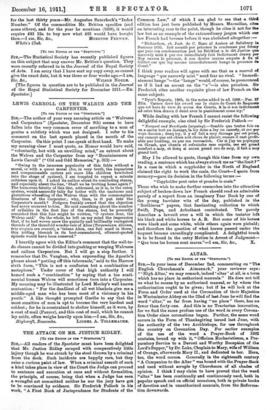THE ATTACK ON MR. JUSTICE RIDLEY.
[To THE EDITOR OF THE " SPECTATOIL."]
Stu,—All readers of the Spectator must have been delighted that Mr. Justice Ridley escaped with comparatively little injury though he was struck by the stool thrown by a criminal from the dock. Such incidents are happily rare, but they raise a curious peint of law. When a criminal assault of such a kind takes place in view of the Court the Judge can proceed to sentence and execution at once and without formalities, the principle, of course, being that when a Judge has seen a wrongful act committed neither he nor the jury have got to be convinced by evidence. Sir Frederick Pollock in his work, "A First Book of Jurisprudence for Students of the Common Law," of which I am glad to see that a third edition has just been published by Messrs. Macmillan, cites
an interesting case to the point, though he cites it not for the law but as an example of the extraordinary jargon which our law French had become before it was abolished altogether "Richardson, ch. Just. de C. Banc al Assises at Salisbury in Summer 1631. fuit assault per prisoner la condemns pur felony quo puis son condemnation ject un Brickbat a le dit Justice qua narrowly mist & pur ceo immediately fuit Indictment drawn per Noy envers le prisoner, & son dexter mantis ampute & fix al Gibbet sur que luy mesme immediatement bongo in presence de Court."
I think your readers will agree with me that as a marvel of language "quo narrowly mist" need fear no rival. " Immedi- atement hange "—the "hange" would, of course, be pronounced as if it had an accent on the "e "—is also priceless. Sir Frederick cites another exquisite piece of law French on the same subject:
"Dyer's Reports, 188b, in the notes added in ed. 1688.—Pas. 37 Eliz. Carnes drew his sword sex le stairs de Court de Requests pie est hors de view de ascun des Courts, & la si son indictment ad estre bien drawn il duist aver le punishment come icy."
While dealing with law French I cannot resist the following delightful example, also cited by Sir Frederick Pollock :—
"Newport and Newdi gate (arguing).—Semble qua toutes fois on on a ascun tort au damage, is ley done a my un remedy, at ceo per voye daecion ; donq icy, ii y ad fait a moy damage per cot prise], car cement quo cet chien soit chose de plaisir, uncore il east profit- able pur hunting, Oil Far ma recreacion. Car si j'ay nn popingay ou thrush, qua chants et refraische mes esprits, coo eat grand comfort a moy, et donq si ascun prend ceo de moy, il fait a moy grand tort.
May I be allowed to quote, though this time from my own
reading, a sentence which has always struck me as "the limit P In a case in which a copyholder in the North of England claimed the right to work the coals, the Court—I quote from memory—gave its decision in the following terms :— "Copyholder pent enter et prendre le coals."
Those who wish to make further researches into the attractive subject of broken-down law French should read an admirable parody of a report from an imaginary Year Book by one of the young barrister wits of the day, published in the " Scriblerus " papers, that fascinating collection to which Swift, Pope, and Arbuthnot contributed. The parody describes a lawsuit over a will in which the teetator left his black and white horses to A. B. But some of his horses were black and some white, while others again were piebald; and therefore the question of what horses passed under the bequest became exceedingly complicated. A delightful touch is to be found in the entry Motion in Arrest of Judgment- " Que taus lea horses sont mares."—I am, Sir, &c., X.


















































 Previous page
Previous page